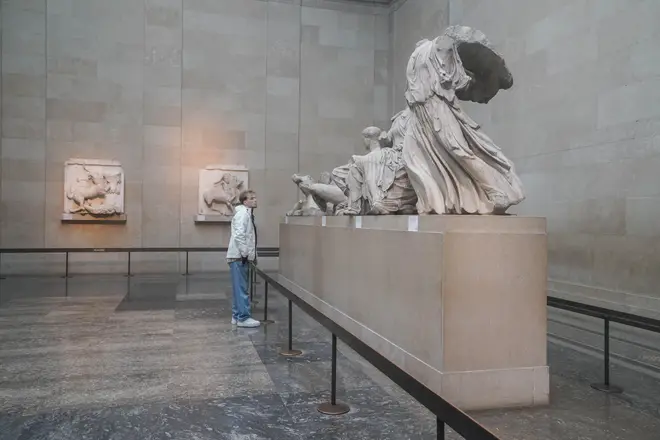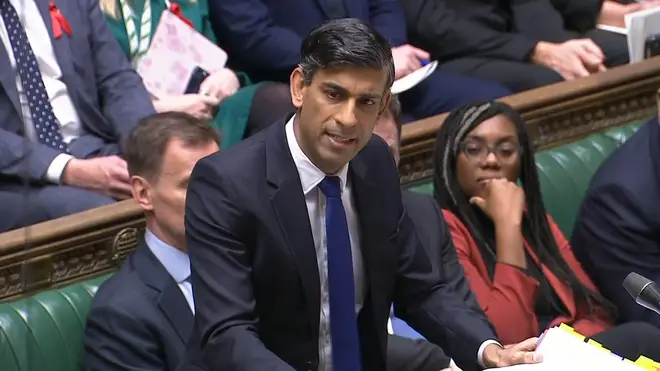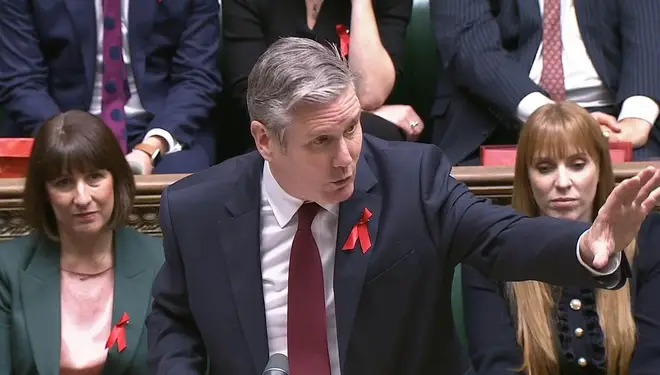
Clive Bull 1am - 4am
3 December 2023, 11:38

A Labour Shadow Cabinet minister has said that Sir Keir Starmer was not "endorsing" Margaret Thatcher despite him praising her in an interview.
Jonathan Reynolds, the Shadow Business and Trade Secretary, said Sir Keir recognised the former Conservative Prime Minister as a figure who "changed things".
The Labour leader wrote in the Sunday Telegraph that Ms Thatcher had “set loose our natural entrepreneurialism” during her 11-year stint as Prime Minister, in comments likely to infuriate the left of his party.
Mr Reynolds told LBC's Matthew Wright that Sir Keir was trying to win over the Conservative voters who felt they weren't well represented by the Tories - but maintained that his leader was not giving Ms Thatcher his backing.
He said: "Look, we do recognise there are a significant number of conservative voters in the UK, who are unhappy with the performance of the Conservative government."

Jonathan Reynolds defends Keir Starmer after he was criticised for praising Margaret Thatcher
But Mr Reynolds said: "It's not about endorsing the particular policy or platform of any... Conservative Prime Minister, you know, I'm not going to come on and do that," he said.
He added that traditional Conservative values like home ownership and controlling immigration were being threatened under the current government.
Mr Reynolds said: "We believe we can say to people - look at how the Labour Party has changed since 2019.
"Look at how we've recognised we were not where we needed to be. We had a terrible result in 2019. Look at how we've changed, how we've tackled anti-Semitism, how we've rebuilt our relationship with business, where we are on issues like defence and national security
Mr Reynolds claimed that Labour "can be the vehicle for change in the country, because we've changed ourselves."

Sir Keir wrote in his Sunday Telegraph piece: “Across Britain, there are people who feel disillusioned, frustrated, angry, worried. Many of them have always voted Conservative but feel that their party has left them.
“I understand that. I saw that with my own party and acted to fix it. But I also understand that many will still be uncertain about Labour. I ask them to take a look at us again.”
Starmer also heaped praise upon former premiers Tony Blair and Clement Attlee in his wide-ranging interview in the newspaper.
Starmer said “in this sense of public service” he had changed in his party from the days it was led by Jeremy Corbyn.
The former lawyer added: “The course of shock therapy we gave our party had one purpose: to ensure that we were once again rooted in the priorities, the concerns and the dreams of ordinary British people. To put country before party.

Starmer claimed his party was “moving back towards voters” while “the Tory party has been steadily drifting away”.
It comes after Sir Keir hit out at Rishi Sunak for "trying to humiliate" the Greek Prime Minister by cancelling a meeting at the eleventh hour over the Elgin marbles.
The Labour leader told MPs that the decision to axe the meeting, because Kyriakos Mitsotakis said that the artefacts should be returned to Athens, was "small politics".
Sir Keir said at Prime Minister's Questions: "Never mind the British Museum, it’s the Prime Minister who’s obviously lost his marbles.
"Mr Speaker, the Greek Prime Minister came to London to meet him. A fellow NATO member; an economic ally. One of our most important partners in tackling economic migration.
"But instead of using that meeting to discuss serious issues, he tried to humiliate him, and cancelled at the last minute. Why such small politics, Prime Minister?"

Mitsotakis was due to meet Sunak on Tuesday but the get-together was cancelled at the last minute after the Greek Prime Minister called for the Elgin Marbles, which were taken from the Parthenon in Athens, to be returned to Greece from the British Museum. A Downing Street spokesperson later accused Greece of focusing on ancient grievances.
Mr Sunak and Mr Mitsotakis had been due to discuss topics like illegal migration, and the wars in Ukraine and Gaza. Deputy Prime Minister Oliver Dowden was offered instead, but Mr Mitsotakis declined this.
Responding to Sir Keir on Wednesday, Mr Sunak said that the Greek Prime Minister was 'grandstanding' with his comments about the marbles.
"Of course we’re always ready to discuss important topics of substance with our allies, like tackling illegal migration or indeed strengthening our security," he said.

"But when it was clear that the purpose of the meeting was not to discuss substantive issues for the future, but rather to grandstand and re-litigate issues of the past, it wasn’t appropriate."
Environment Secretary Steve Barclay told LBC's Nick Ferrari that the Elgin Marbles constituted a "settled issue". "The British Museum is an absolute treasure, it’s something that people from around the world come and enjoy," he said.
Sir Keir opened questioning on Wednesday with a joke conflating the Marbles and the Conservatives.
He said: "In an effort to hide from his failures, his party spent this week arguing about an ancient relic that only a tiny minority of the country have any interest in - Mr Speaker, that’s enough about the Tory Party."
Greek foreign minister Giorgos Gerapetritis reiterated Greece's claim to the Marbles on Wednesday, after a meeting with Foreign Secretary Lord Cameron. "What I have to say is that the unification of the Parthenon Sculptures is a claim which is based not only on history, not only on justice but it's a claim of ecumenical cultural values," he said.

Giorgos Gerapetritis, the Greek foreign minister, said on Tuesday that cancelling such a meeting was "unheard of".
He added: "It is a massive diplomatic indiscretion. Even Israel and Hamas communicate."
Sir Keir did meet with Mr Mitsotakis on Monday. The Labour leader told MPs that the pair discussed the economy and migration, and that he told the Greek Prime Minister he wouldn’t change the law prohibiting the British Museum from handing over the Marbles.
"It’s not that difficult, Prime Minister," he told Mr Sunak. "The reality is simple: he has no plan on boat crossings, and migration is at a record high."
Sir Keir also said: "In 2019 they promised the country that they would control immigration, numbers will come down, the British people will be in control. How’s it going?"

Mr Sunak replied: "Let me be crystal clear, the levels of migration are far too high, and I’m determined to bring them back down to sustainable levels."
The Prime Minister also accused Sir Keir of being too close to the EU, claiming that the Labour leader would "back Brussels over Britain every single time".
He also referred to Sir Keir's comments on Classic FM that Beethoven's Ode to Joy - the EU anthem - was the piece of classic music which best "sums up the Labour Party."
Mr Sunak said: "No-one will be surprised that he's backing an EU country over Britain. Just this last week he was asked which song best sums up the Labour Party.
"What did he come up with? Well, he showed his true colours and chose Ode to Joy, literally the anthem of the European Union, and he will back Brussels over Britain every single time."

Keir Starmer speaks to Classic FM on 'Ode to Joy'
The Elgin Marbles - also known as the Parthenon Marbles - are 2,500-year-old sculptures that Lord Elgin took from Athens and sold to the British government in 1816.
Lord Elgin's venture has been debated for more than 200 years. Some say that the Marbles were not being properly looked after on the Parthenon, and they are safer in the British Museum.
The museum said Lord Elgin's actions "were thoroughly investigated by a Parliamentary Select Committee in 1816 and found to be entirely legal, prior to the sculptures entering the collection of the British Museum by Act of Parliament."

Steve Barclay on Parthenon marbles row
The 1963 British Museum Act forbids the museum from giving away items in its collection, apart from under limited conditions.
The Marbles formed a 520ft frieze that ran around the outer walls of the Parthenon.
Carved between 447-432 BC, the frieze and other sculptures remained largely intact until the temple was partially blown up during a siege in 1687. The Parthenon was being used as a gunpowder store at the time by a Turkish garrison.
Mr Mitsotakis said taking the Marbles from Athens was like cutting the Mona Lisa in half.
Greece formally requested the Marbles' return in the early 1980s. Calls for the artefacts' repatriation have become louder in subsequent decades.

Caller on the Elgin Marbles
A Greek official claimed earlier this year that their government had been in talks with the British Museum over the temporary return of the marbles.
The official said: "We are working on a broad and lengthy cultural agreement that would include an interchange and rotation of historical artefacts between Greece and the British Museum." The museum said it has never received a loan request for the Marbles.